Burns Suppers have been part of Scottish culture for about 200 years as a means of commemorating their best loved bard. And when Burns immortalised haggis in verse he created a central link that is maintained to this day. The ritual was started by close friends of Burns a few years after his death in 1796 as a tribute to his memory. The basic format for the evening has remained unchanged since that time and begins when the chairman invites the company to receive the haggis.
Robert Burns (25 January 1759 – 21 July 1796), also known familiarly as Rabbie Burns, was a Scottish poet and lyricist. He is widely regarded as the national poet of Scotland and is celebrated worldwide. He is the best known of the poets who have written in the Scots language, although much of his writing is in a “light Scots dialect” of English, accessible to an audience beyond Scotland. He also wrote in standard English, and in these writings his political or civil commentary is often at its bluntest.
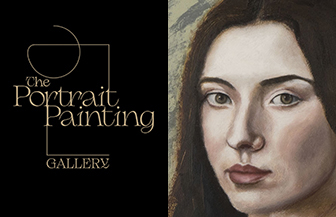 |
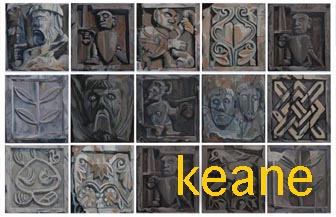 |
 |
 |
THE FORMAT FOR A BURNS SUPPER
Chairperson’s opening address A few welcoming words start the evening and the meal commences with the Selkirk Grace The company are asked to stand to receive the haggis. A piper then leads the chef, carrying the haggis to the top table, while the guests accompany them with a slow handclap. The chairman or invited guest then recites Burns’ famous poem To A Haggis, with great enthusiasm. When he reaches the line ‘an cut you up wi’ ready slight’, he cuts open the haggis with a sharp knife. It’s customary for the company to applaud the speaker then stand and toast the haggis with a glass of whisky. The company will then dine.
A typical Bill o’ Fare would be: Cock-a-leekie soup Haggis warm reeking, rich wi’ Champit Tatties, Bashed Neeps Tyspy Laird (sherry trifle) A Tassie o’ Coffee
The Immortal Memory One of the central features of the evening. An invited guest is asked to give a short speech on Burns. There are many different types of Immortal Memory speeches, from light-hearted to literary, but the aim is the same – to outline the greatness and relevance of the poet today.
Toast To The Lasses The main speech is followed by a more light-hearted address to the women in the audience. Originally this was a thank you to the ladies for preparing the food and a time to toast the ‘lasses’ in Burns’ life. The tone should be witty, but never offensive, and should always end on a concilliatory note.
Response The turn of the lasses to detail men’s foibles. Again, should be humorous but not insulting.
Poem and Songs Once the speeches are complete the evening continues with songs and poems. These should be a good variety to fully show the different moods of Burns muse. Favourites
for recitations are Tam O’ Shanter, Address to the Unco Guid, To A Mouse and Holy Willie’s Prayer.
The evening will culminate with the company standing, linking hands and singing Auld Lang Syne to conclude the program
Fair fa’ your honest, sonsie face,
Great chieftain o’ the puddin-race!
Aboon them a’ ye tak your place,
Painch, tripe, or thairm:
Weel are ye wordy o’ a grace
As lang’s my arm.The groaning trencher there ye fill,
Your hurdies like a distant hill,
Your pin wad help to mend a mill
In time o’ need,
While thro’ your pores the dews distil
Like amber bead.His knife see rustic Labour dicht,
An’ cut you up wi’ ready slicht,
Trenching your gushing entrails bricht,
Like ony ditch;
And then, O what a glorious sicht,
Warm-reekin, rich!Then, horn for horn, they stretch an’ strive:
Deil tak the hindmaist! on they drive,
Till a’ their weel-swall’d kytes belyve,
Are bent like drums;
Then auld Guidman, maist like to rive,
“Bethankit” hums.Is there that o’re his French ragout
Or olio that wad staw a sow,
Or fricassee wad mak her spew
Wi’ perfect scunner,
Looks down wi’ sneering, scornfu’ view
On sic a dinner?Poor devil! see him ower his trash,
As feckless as a wither’d rash,
His spindle shank, a guid whip-lash,
His nieve a nit;
Thro’ bloody flood or field to dash,
O how unfit!But mark the Rustic, haggis fed,
The trembling earth resounds his tread.
Clap in his wallie nieve a blade,
He’ll mak it whistle;
An’ legs an’ arms, an’ heads will sned,
Like taps o’ thristle.Ye Pow’rs wha mak mankind your care,
And dish them out their bill o’ fare,
Auld Scotland wants nae skinkin ware
That jaups in luggies;
But, if ye wish her gratefu’ prayer,
Gie her a haggis!
————
I banchetti di Burns sono parte della cultura scozzese da circa 200 anni come mezzo per commemorare il loro poeta più amato. E quando Burns ha immortato l’haggis in versi, ha creato un legame centrale che viene mantenuto ancora oggi. Il rituale è stato iniziato da amici intimi di Burns pochi anni dopo la sua morte nel 1796 come tributo alla sua memoria.
Il formato di base per la serata è rimasto immutato da allora e inizia quando il presidente invita la compagnia a ricevere l’haggis.
Robert Burns (25 gennaio 1759 – 21 luglio 1796), noto anche come Rabbie Burns, è stato un poeta e paroliere scozzese. È ampiamente considerato il poeta nazionale della Scozia e viene celebrato in tutto il mondo. È il poeta più noto tra quelli che hanno scritto in lingua scozzese, anche se gran parte della sua scrittura è in un “dialetto scozzese leggero” dell’inglese, accessibile a un pubblico al di fuori della Scozia. Ha anche scritto in inglese standard e in queste scritture il suo commento politico o civile è spesso al suo più schietto.
Il formato per un banchetto di Burns:
Indirizzo di apertura del presidente: alcune parole di benvenuto iniziano la serata e il pasto inizia con la Selkirk Grace. La compagnia è invitata a alzarsi per ricevere l’haggis. Un suonatore di cornamusa quindi guida il cuoco, che porta l’haggis al tavolo principale, mentre gli ospiti li accompagnano con un applauso lento. Il presidente o l’ospite invitato recita quindi il famoso poema di Burns To A Haggis, con grande entusiasmo. Quando raggiunge la linea ‘e ti tagli con un leggero colpo’, apre l’haggis con un coltello affilato. È consuetudine per la compagnia applaudire il relatore e poi alzarsi e brindare all’haggis con un bicchiere di whisky. La compagnia quindi cenerà.
Un tipico Bill o’ Fare sarebbe:
-Zuppa Cock-a-leekie
-Haggis caldo, reso e ricco con Champit Tatties, Bashed Neeps
-Tyspy Laird (torta di sherry)
-A Tassie di caffè
La memoria immortale: una delle caratteristiche centrali della serata. Viene chiesto a un ospite di fare un breve discorso su Burns. Ci sono molti tipi diversi di discorsi di memoria immortale, dalleggeri fino alla letteratura, ma lo scopo è sempre lo stesso: delineare la grandezza e la rilevanza del poeta oggi.
Brindisi alle signore: il discorso principale è seguito da un indirizzo più leggero per le donne in sala. Originariamente era un ringraziamento alle signore per la preparazione del cibo e un momento per brindare alle ‘signore’ nella vita di Burns. Il tono dovrebbe essere spiritoso, ma mai offensivo, e dovrebbe sempre finire con una nota conciliatoria.
Risposta: il turno delle signore per descrivere i difetti degli uomini. Anche in questo caso, dovrebbe essere umoristico ma non insultante.
Poesie e canzoni: una volta che i discorsi sono completi, la serata continua con canzoni e poesie. Questi dovrebbero essere una buona varietà per mostrare appieno i diversi umori della musa di Burns. I preferiti per le recite sono Tam O’ Shanter, Indirizzo agli Unco Guid, To A Mouse e Holy Willie’s Prayer.
La serata culminerà con la compagnia che si alza, si stringe le mani e canta Auld Lang Syne per concludere il programma.



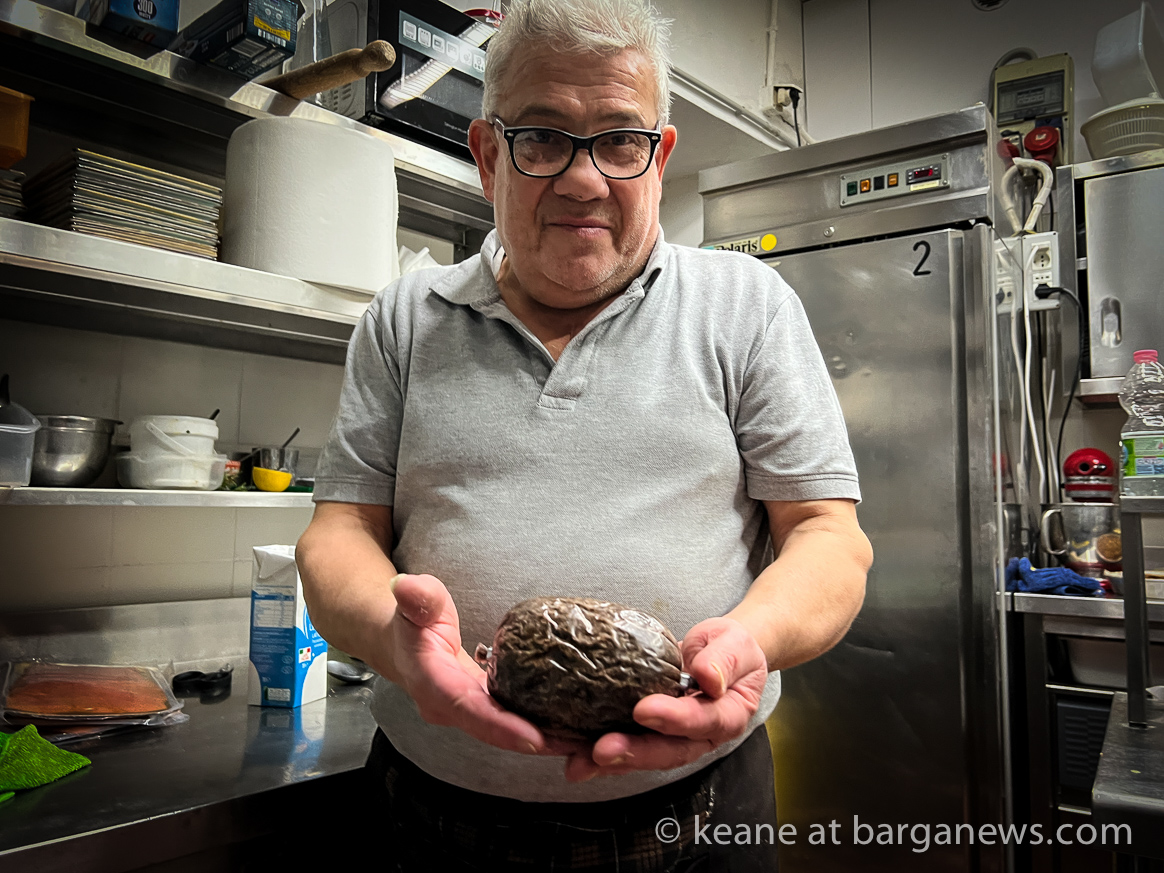

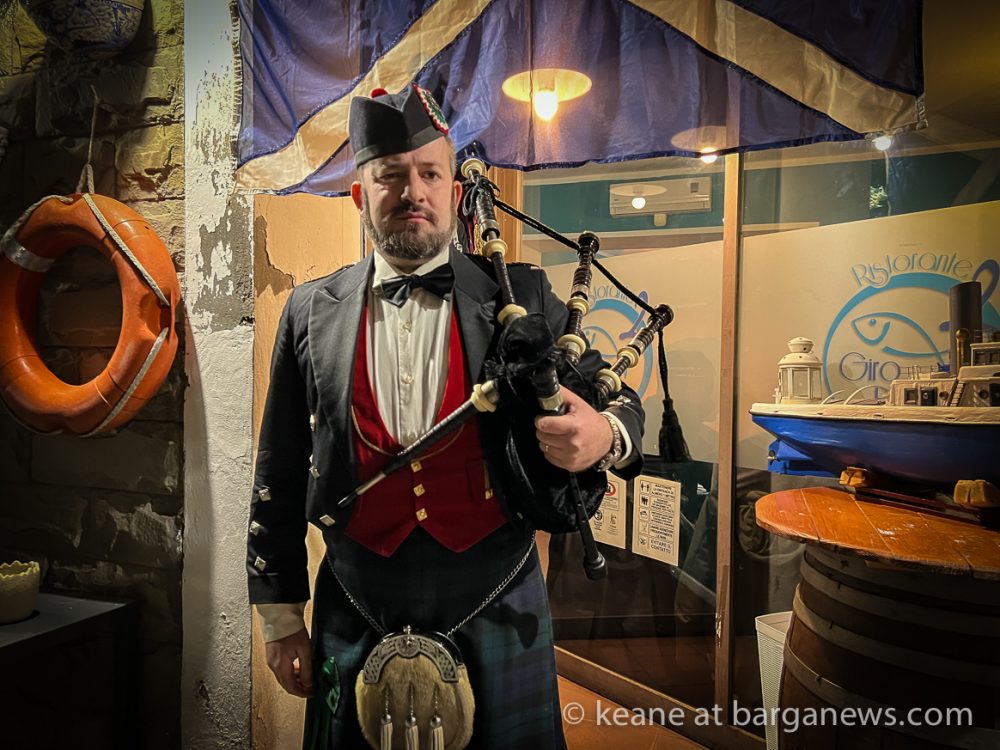
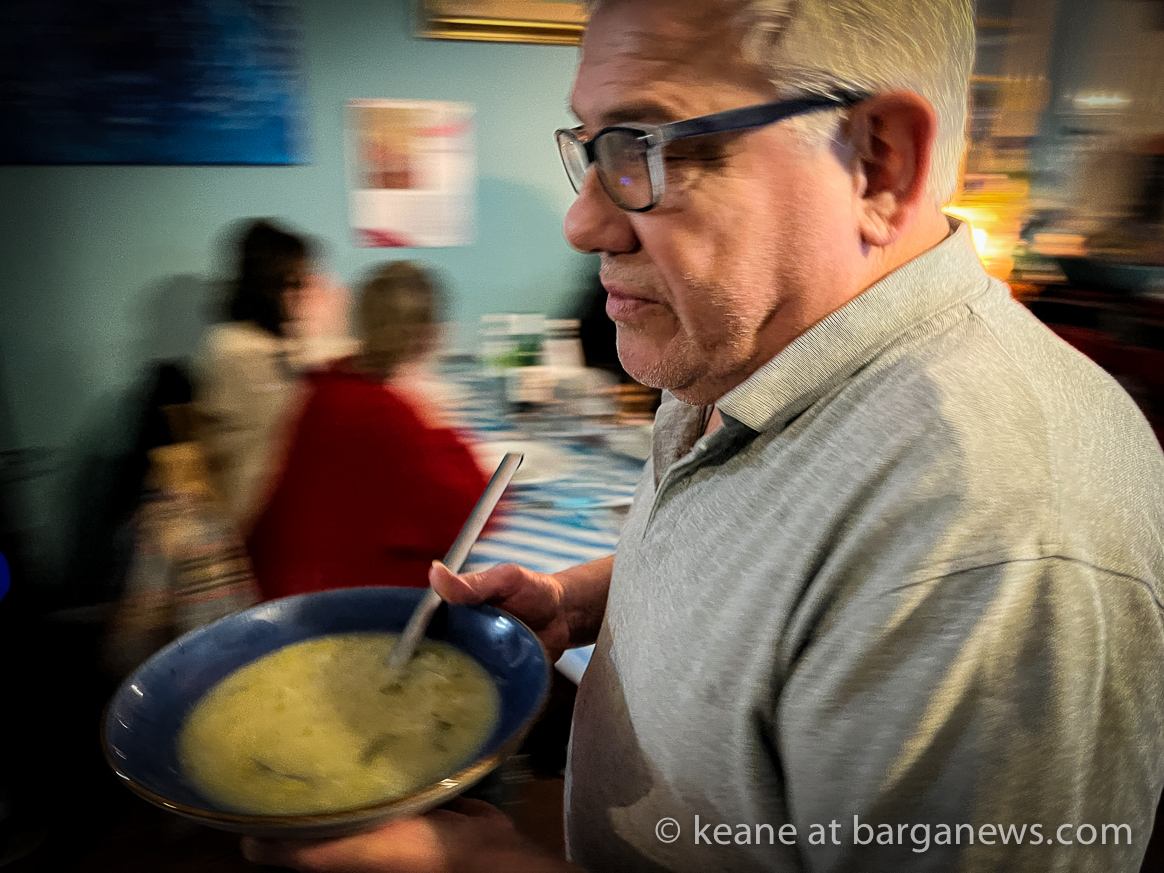



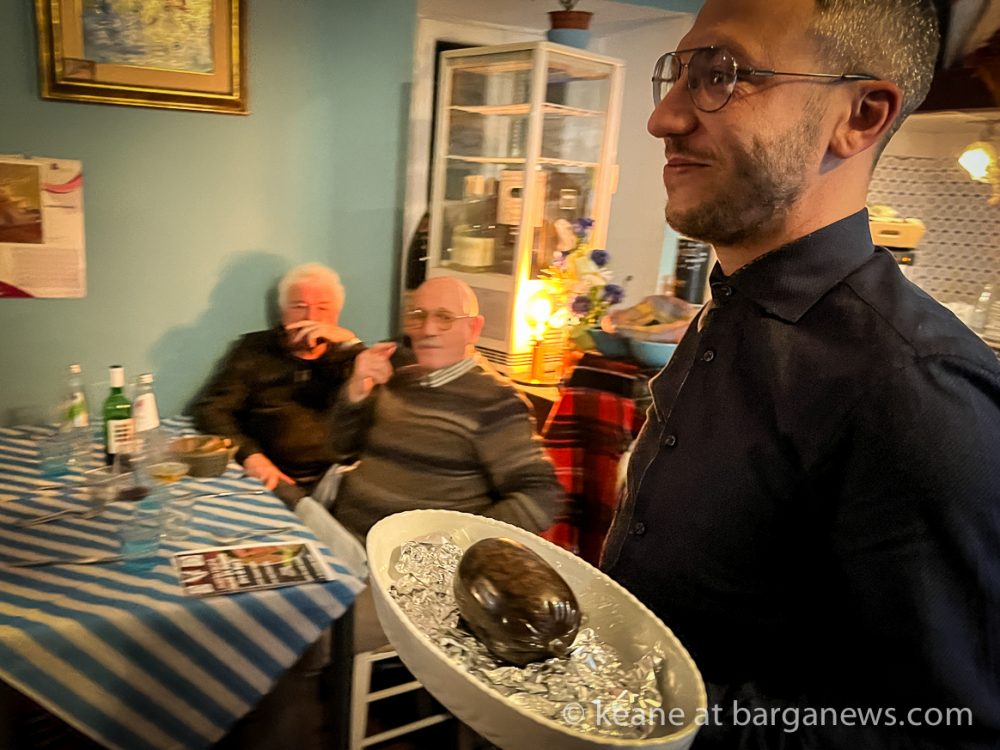
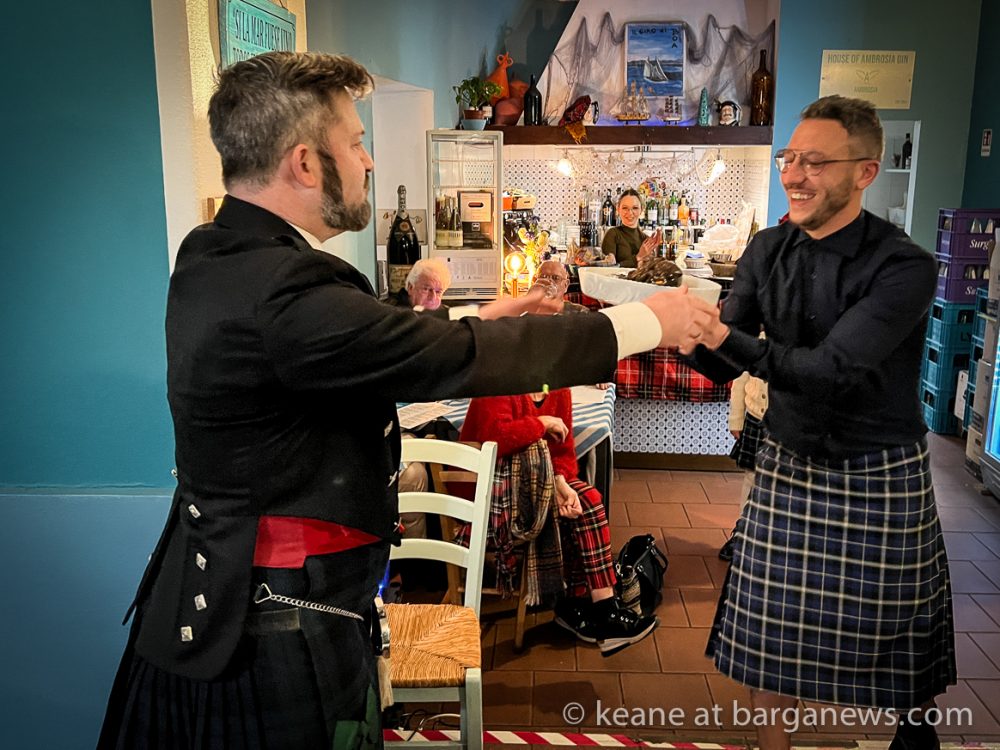
Address to a haggis.
(Suitable for Vegetarians)
Once mighty stuff fit for Ayre men,
Now feeds the glaikit vegetatian.
Full-bodied, a feast of blood and guts,
Taen ower waesucks! By health-food nuts.
Great Chieftain’s now a whingin slave,
O the common microwave.
A shadow o his former sell,
Six minutes birling rings a bell.
Dizzy fizzing drummock bing,
You wouldna recognise the thing.
Nae fair and honest sonsie face,
Jist meat free sconner in his place.
Trenching your gushing entrails bright,
Leaves only lentils for ma kyte.
Nae rustic knife for you ma loun,
Sic a dinner carves well wae a spoon.
Warm-reeking rich, are Robin’s wurdies,
Pulses don’t stick tae yer hurdies.
So celebrating Bardic birth,
Wi swats an whisky makin mirth,
False puddin reekin on yir table,
Mind the ruminator’s fable.
Heed well his herbivorial rants,
Chief lentil sticks well tae yer pants.
Carlo Umberto Burns.
this comment was written in 1996 (200th aniversary of the bard’s death) for the Ellon Burns society in Aberdeenshire by Zambo and first published on barganews 15 years ago – a big shout out to Carlo and Izzy Zambonini